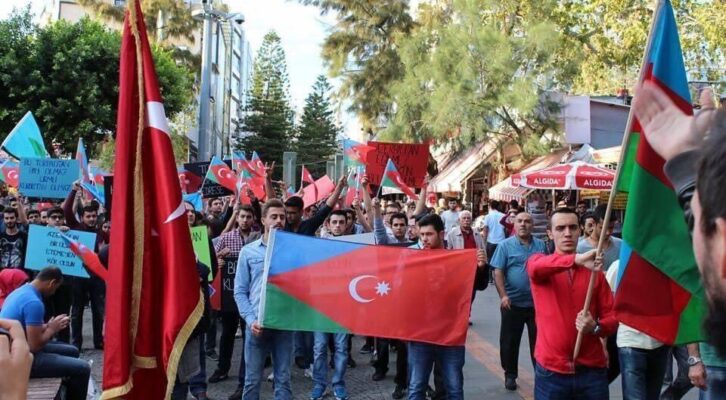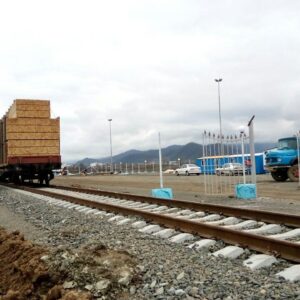Political relations between Azerbaijan and Iran are deteriorating amid signs of closer security and diplomatic cooperation between Baku and Tel Aviv. Israel’s Foreign Minister Eli Cohen’s comments to reporters in Jerusalem on March 29 about his “agreement” with his Azerbaijani counterpart to form a “united front against Iran” have raised eyebrows in Iran. This announcement was followed by the establishment of the “South Azerbaijan National Council of Statehood” (SANCS) backed by Baku and Tel Aviv. The following article will highlight and interconnect these developments and identify Iran’s choices to contain the Israeli-Azerbaijani axis in the South Caucasus.
After the 2020 Artsakh war and the increase of Turkey’s influence in the South Caucasus at the expense of Russia and the territorial changes that followed, the balance of power in the region shifted, and Iran felt isolated on its northern border. Demands by Ankara and Baku for the establishment of the “Zangezur Corridor” as an extraterritorial corridor cutting the Armenia-Iran border have alarmed not only Yerevan, but also the leadership in Tehran. If such a corridor is established, Iran will be at the mercy of Turkey and Azerbaijan when it comes to trade relations with Europe and Russia. Such a factor will have geo-economic and geopolitical consequences with the increase of Turkish influence and the solidifying of pan-Turkic aspirations in Northern Iran.
The Establishment of the “South Azerbaijan National Council of Statehood”
On April 22, an Azerbaijani propaganda channel quoted Genghis Goiturk, an Iranian-Azeri political activist in Finland, announcing the launch of SANCS. “Along with the geopolitical developments taking place in the region where our homeland Azerbaijan is located, the importance and decisive role of the national movement initiated by the Azerbaijani Turks living in South Azerbaijan (Northern Iran) for the restoration of their national statehood has once again been shown in the national, political and social processes that are intensifying in the country called Iran,” argued Goiturk. The announcement also mentioned its aim to exhibit an “independent will for the restoration” of Azerbaijani “national statehood.”
According to the report, the “objectives” of the “National Council of Statehood” (NCS) can be summarized as follows:
- The “South Azerbaijan NCS” is based on the national political idea of establishing an Azerbaijani state in Northern Iran and the basic principles of the pan-Turkic national ideology. It operates in the direction of the establishment of a national statehood with the motto “freedom, justice and national government.”
- SANCS considers Azerbaijan as its homeland and its territorial integrity as inviolable. The initiative aims to unite all of Azerbaijan along with the “Ardabil, East Azerbaijan, West Azerbaijan, Zanjan, Hamadan and Qazvin provinces of South Azerbaijan.”
- SANCS believes in the necessity of independent decision-making of the “South Azerbaijan National Movement” and aims for the realization of a formation of unified national power.
- SANCS calls for equality between men and women and considers the struggle for women’s rights part of its national struggle.
- SANCS is open for political discussions and consultations with all groups that support and recognize the South Azerbaijan National Movement, except for “terrorist groups.”
- SANCS believes that civil and cultural struggle are acceptable ways for self-defense.
- SANCS respects ethnic and religious minorities and calls for the creation of an equal civil society in “South Azerbaijan.”
- SANCS rejects Iran and Iranianism and fights for the creation of a “modern, democratic and secular South Azerbaijan state.”
A constituent assembly was reportedly formed this week, coordinated by Goiturk; Saleh Ildyrim, the chairman of the Independence Party of South Azerbaijan; Ahmet Obali, the founder of the “Gunaz” satellite TV channel; Ajdar Tagizade, the chairman of the Democratic Turkic Party of South Azerbaijan; Sadik Isabeyli a member of the Board of the National Liberation Front of South Azerbaijan and others. The organization’s headquarters will be located in Finland.
Israeli Fingerprints and Possible Future Coordinated Attack on Iran
Is there a coincidence between the announcement of the Israeli Foreign Minister and the establishment of SANCS?
In response to the above-mentioned remarks made by the Israeli Foreign Minister in Jerusalem, Iran’s Foreign Ministry spokesman Nasser Kanani said that this is clear evidence of the “sinister intentions of the Zionist regime” to turn Azerbaijan into a platform to threaten Iran’s national security. The Iranian diplomat also asked for an explanation from Baku, which denied that its Foreign Minister made any remarks against Iran and accused Iran of working “towards causing crisis.”
A few days after Reza Pahlavi, the son of the former Iranian Shah, visited Israel, 32 Israeli Knesset (Parliament) members (most far-right politicians) sent a letter to their Foreign Minister urging Israel to put international pressure on Tehran to prevent “acts of violence against the Azeri minority that lives in the Southern Azeri province in north-western Iran.” This move also came shortly after Israeli FM Eli Cohen paid an official visit to Baku and met President Ilham Aliyev, aiming to deepen economic and security ties between both countries. The letter of the Knesset members mentioned that “[Azeris] are the largest ethnic group in Iran, numbering more than 20 million people. The [Iranian] regime implements a policy of cultural genocide by restricting the rights of the Azeri minority to study and pass on its heritage, to teach their language, and even to register their children with Azeri names.” The letter also added that “Garnering wide international support as much as possible for the national aspirations in Southern Azerbaijan will constitute a fatal blow to the Ayatollah regime, and there is no doubt that if the sovereign state of South Azerbaijan is established, Israel will merit another ally in the region alongside the Republic of Azerbaijan.” Israel’s diplomatic activities toward Azerbaijan intensified when Baku opened an embassy in Tel Aviv in March.
These announcements and steps should not come as a surprise, but they are a result of a coordinated action between Baku and Tel Aviv. The former wants to resolve the Artsakh issue by force and ethnically cleanse Armenians from their homeland so that later it concentrates on its southern neighbor perceiving it as an “existential threat.” As for Israel, by resolving the “Armenian issue” from Artsakh and having Russian forces removed, it could freely use the Azerbaijani military infrastructure in the bordering areas with Iran to launch future attacks against Tehran. Hence, the presence of Armenians in the region and the deployment of Russian troops are the only obstacles for Israel and its allies to launch coordinated attacks with Azerbaijan against Iran.
In an interview with the Armenian Weekly, Dr. Ehsan Movahedian, a professor of international relations at Tehran’s ATU University, argued that Iran is very skeptical about Baku’s cooperation with Israel in the South Caucasus. “Israel intends to be present in parts of Iran’s neighborhood in retaliation for Iran’s presence in many neighboring countries. For this purpose, Israel tried to be present in Iraqi Kurdistan but failed due to Iran’s missile attacks on this region,” Dr. Movahedian stated. “Considering the improvement of Iran’s relations with Saudi Arabia and other Arab countries, only Iran’s neighbors in South Caucasus and Central Asia are left for Israel to influence. The main goal of this cooperation is to strengthen the separatist tendencies in the northwest of Iran.” Dr. Movahedian argued that the support of 32 members of the Israeli Knesset for the separation of regions from Iran and the formation of the “fake government of South Azerbaijan” shows that Israelis, who are worried about the increase in Iran’s military and intelligence capabilities, are trying to counter this capability in any way possible. For this purpose, they use Azerbaijan as a proxy against Iran.
Will Iran retaliate?
Iran may reportedly take military action against Azerbaijan if the latter escalates. According to a March 2022 article by Amwaj, after Iran targeted the alleged “Israeli strategic center” in Iraqi Kurdistan with ballistic missiles, a closer collaboration between Baku and Tel Aviv could “trigger a targeted Iranian military operation against individual sites on Azerbaijani soil.” Of course, this can be a risky scenario as it would attract additional Turkish and Israeli intervention in favor of Azerbaijan and may jeopardize the North-South trade as Azerbaijan is the only bridge for now between Russia and Iran in the framework of the International North-South Transport Corridor. However, if the development escalates despite Iran’s attempt to de-escalate and telephone conversations between the Iranian and Azerbaijani Foreign Ministers, Iran may go for a final resort with a limited military operation to put an end to President Aliyev’s expansionist aspirations.
Moreover, Dr. Movahedian mentioned that the recent military drills by Iranian forces were a direct message to Ankara, Baku and Tel Aviv, warning that if they attempt to change borders, then Iran will deal with the aggressor countries with force. This idea was also brought up by Iranian Spiritual Leader Ayatollah Khamenei, who spoke about the necessity of preserving the thousand-year-old border between Iran and Armenia during the Tehran Summit in front of the Russian and Turkish presidents. For this reason, Dr. Movahedian argues that President Aliyev, being aware that any attack on Syunik near the Armenian-Iranian border would trigger retaliation from the Iranian side, is seeking to occupy the Armenian populated parts of remaining Artsakh.
In addition to military pressure, Dr. Movahedian argues that Iran also can use levers of economic pressure against Azerbaijan. “The most important tool in this field is the diversification of North-South communication corridor paths. In addition to completing the Rasht-Astara railway (between Iran and Azerbaijan), Iran should connect to Russia through the Caspian Free Zone port near Anzali port and take steps to create a suitable corridor route from the Meghri border to the territory of Armenia and then Georgia,” added the Iranian expert. He concludes that Iran may even go further by supporting ethnic and religious minorities and religious or even secular groups in Azerbaijan. Finally, Iran, Armenia, India and Russia should strengthen their ties and increase their economic, military, cultural and informational cooperation.
The article was originally published in the Armenian Weekly, 9/5/2023.
Yeghia Tashjian is a Lebanese-Armenian regional political analyst and researcher. He graduated from the American University of Beirut in Public Policy and International Affairs. He also participated in and graduated from Swedish Defense University’s “Strategic Leadership in Global Societal Security Programm” (2022). He pursued his BA at Haigazian University in political science in 2013. His MA thesis topic was on China’s geopolitical and energy security interests in Iran and the Persian Gulf, currently, he is researching on the Turkish-Russian “co-opetition” in the MENA+ Caucasus region. He is a contributor to various local and regional newspapers, a columnist in the Armenian Weekly, and presented various topics from minority rights to regional security issues. He is an Associate Fellow at the Issam Fares Institute for Public Policy and International Affairs at the American University of Beirut and a part-time instructor in International Affairs at the American University of Science and Technology-Beirut.







